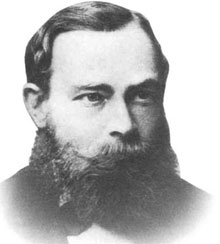
Photograph of the young Gotlob Frege, c 1879
Frege
Friedrich Ludwig Gottlob Frege (8 November 1848 – 26 July 1925), mathematician and philosopher, was the founder of modern logic. In his writings on philosophy of logic, philosophy of language, and philosophy of mathematics, he was also the founding father of analytic philosophy. He was an important influence on Bertrand Russell, Ludwig Wittgenstein, Rudolf Carnap, and W. V. Quine.
Frege was early on drawn to the project, begun by Bolzano, of freeing number theory, algebra and the calculus (but not necessarily geometry) from any dependence on Kantian intuition. He considered his work to have established that arithmetical truths are logical truths, until the discovery in 1900 by Russell of the paradox that bears his name. However the predicate calculus, and in particular Frege’s introduction of quantification theory into logic, was an achievement unprecedented in the long history of logic, particularly by virtue of the completeness theorem for the predicate calculus proved by Kurt Godel in 1929.
Frege was also involved in an important controversy with David Hilbert over the nature of consistency proofs in mathematics and the role of axiomatisation in physics and mathematics. In philosophy of language, his distinction between sense and reference of proper names proved of seminal influence.
He was born and educated in Wismar in the state of Mecklenburg-Schwerin in Germany. He studied physics and mathematics at the University of Jena, and obtained a doctorate in mathematics at the University of Gottingen under Ernst Schering in 1873. He was subsequently appointed lecturer at the University of Jena and, in 1879, Extraordinary Professor.
Links
Wikisource. Gottlob Frege: On sense and reference >
Stanford Encyclopedia of Philosophy: Gottlob Frege >
Stanford Encyclopedia of Philosophy: The Frege-Hilbert controversy >
Internet Encyclopedia of Philosophy >
